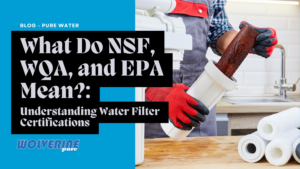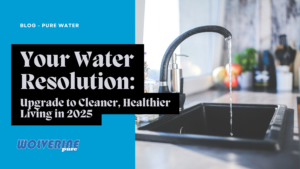Is your favorite sweater starting to fade or feel thin after just a few washes? The likely culprit is hard water.
Nearly 85% of homes have hard water, so unless you already have a whole-home water purification system installed, hard water is likely putting a damper on your cleaning regimen. Hard water is full of extra minerals, like calcium and magnesium. While it’s technically safe to drink, clean and wash with, these extra minerals can lead to costly problems. A study from Purdue University found that fabrics washed in hard water wear out 15% faster than clothes washed in softened water. Here are three reasons that hard water may be leading to extra wear-and-tear on your laundry.
1. Mineral buildup
Soap and laundry detergent are chemically designed to lift away dirt from your clothes and break it down so it can be rinsed away. But if you have hard water running through your washing machine, the extra minerals combine with the detergent, preventing it from working effectively. Rather than lifting the dirt and rinsing it away, the extra minerals bind and trap the detergent within the fibers of your clothes. Throw that load of laundry in the heat of the dryer and the soap residue causes even more damage.
Not only do your clothes feel rough and stiff when you take them out, but it makes it harder to get them really clean during future washes. With each wash, you trap more minerals and soap residue within your clothes, meaning any detergent that is working efficiently isn’t able to properly penetrate the fabric. The more soap residue that clogs your fibers, the harder it is to really clean the garment. Plus, these minerals can cause gray or yellow discoloration or visible streaks. No amount of bleach or fabric softener will truly solve the problem. Over time, this trapped residue will weaken the fibers, causing thinning or even holes in your favorite pieces.
2. Cleaning inefficiency
Once you notice that your clothes don’t really feel clean, you may start to use more detergent to get the job done, or invest in hard water laundry additives or fabric softeners to achieve the result you want. The trapped soap residue not only causes staining but can prevent specialty stain removers and detergents from effectively lifting other types of stains from your family’s clothes. No matter how great a product normally is at lifting stubborn grass stains, it won’t work as effectively in hard water.
These specialty products aren’t cheap, and their cost can add up to big money over time. Not to mention, the harder your machine works to clean your clothes, the faster it breaks down. Overall, hard water prevents your washing machine from really getting the job done.
3. Clogged pipes and components
In extreme cases, the extra mineral content in hard water can cause nasty build-up on pipes, the internal components of your appliances, and your faucets and fixtures. Not only does this lead to damage and inefficiency in your appliances, but it can lead to costly problems like reduced flow, clogs or added pressure on your pipes. Hard water may not seem like a big deal until it forces you to pay up for a new washing machine.
There are many specialty products on the market today aimed at combating the nasty effects of hard water on your laundry. While they may provide temporary solutions, they won’t fix the root cause of the problem.
Increase the lifespan of your favorite clothes, appliances, and plumbing fixtures with a whole-home water purification system from Wolverine Water. Running pure, clean water through your washing machine will allow your laundry detergent to work effectively and efficiently, resulting in fresh, clean clothes that can withstand years of washing.
Want to take the first step? Schedule a FREE in-home water test today to find out exactly what’s in your water, how it’s affecting your home, and how a whole-home system can help.





